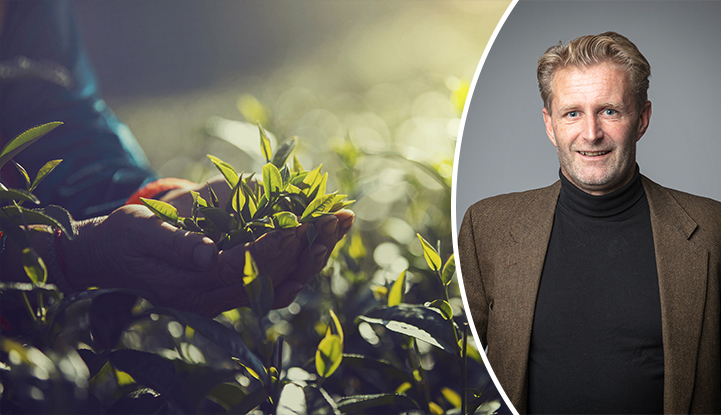New honorary doctor makes commercially viable biogas technology for the sake of the climate
2021-04-30

Fredrik Johansson has been awarded an honorary doctorate due to his contributions to successfully scaling up and making commercially viable some of the techniques developed within the research area of Resource Recovery at the University of Borås. He is a business developer at the textile company FOV Fabrics, which, among other things, manufactures textile bioreactors that convert organic waste into biogas. In recent years, he has participated in a number of different projects together with the University of Borås.
"A lot of companies today are riding the sustainability wave and are trying to profit from it, to commercialise it. At the same time, nothing is really happening behind the scenes. We try to work in exactly the opposite way, by truly ensuring that the things we do have good evidence behind them. We base our actions on the knowledge we have today. We are constantly looking forward – and to do so, we are following the research.”
He talks about the importance of research as a starting point for the actions of business and industry; for FOV, it has always been a given to collaborate with universities, both in Sweden and internationally. A fruitful journey began when Fredrik Johansson attended a seminar at Smart Textiles at the University of Borås almost ten years ago. There, Professor Mohammad Taherzadeh lectured on the subject of waste refinery.
"He talked about converting waste, which is basically just seen as a big problem, into environmentally sound energy. I was very fascinated by how old waste could become energy in the way he described and asked: why isn't everyone doing this? It's a great thing! The answer was: it's too expensive.”
But Fredrik Johansson, as the university suggests in its justification for selecting him as an honorary doctor, has an ability to see possibilities. He was excited to take on the challenge of solving the problem of costs: through a more efficient and better alternative to the traditionally expensive and large biogas plants.
"I thought that if we could develop a biogas plant that is significantly cheaper than today's and also simpler, this would have a greater impact. And if we could make it using a textile material, we could sell biogas plants almost like IKEA products. We could produce everything in a factory somewhere, then pack the materials, folded and rolled up, and then they can be unpacked and installed when they arrive on site.”
He presented the idea to Mohammad Taherzadeh – who was convinced. It was the beginning of an exciting development journey that, despite many challenges along the way, led to textile bioreactors that replace stainless steel or concrete and that are now a commercial product on the market today.
The target group was initially European farmers, but as installation turned out to be easier in warm countries and they also had a greater need for biogas, the initiative began there. The new production systems have been introduced in a number of countries such as Brazil, Nigeria, Indonesia, Vietnam, and India. The next ambition is to turn to countries with colder climates.
"The idea is to establish some kind of commercial platform that we can build upon. This is a slow process and we haven't quite gotten there yet, but our goal early on was that we would become one of the most knowledgeable biogas companies in the world.”
Future plans include further developing and refining the concept by moving from a simple biogas plant to a biogas refinery.
"It sounds cool and so it is, partly. It is about maximum extraction from the waste and taking out what is of the highest value. For example, in the production of biogas, fatty acids, ethanol, and bio-based fertiliser can also be extracted. We can set up different types of biorefineries to suit the individual customers’ needs.”
Fredrik Johansson, who has a background as an economist and project and business developer as well as management consultant both in Sweden and internationally, has a clear driving force.
"It's about development, of products but also of organisations, groups, and environments. Creating good development environments is something that I am very interested in. What makes some actors very successful? Cities with colleges and universities often develop more positively than cities without," he said, pointing to the importance of knowledge and research.
“What are we going to see tomorrow? Well, what we're learning and researching today. What we are doing today is our future. That's why we work a lot with the University of Borås. The University of Borås is incredibly important both for us as a Borås-based company, but also for the entire city and for the region of Sjuhärad.”
Thinking ten years in the future, he still sees himself as committed and active in the same field.
"Waste and resource recovery is the future and that will be the case for a long time. There will be a huge development in this area – to which I would like to contribute. It's important for me to be able to benefit society. And I always do my best, no matter what I do," said Fredrik Johansson.
Read more
Lena Carlsson, translation by Eva Medin
Adobe Stock/Jessica Kirkfjell

